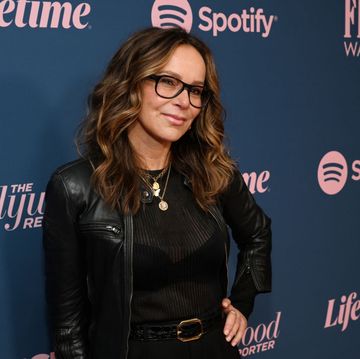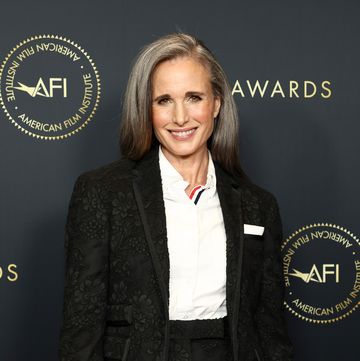After delivering four kids by the age of 26, Denise Folcik took a look in the mirror one day and decided it was time to reclaim her pre-baby body. A friend had casually mentioned that her sister threw up after she ate in an effort to manage her waistline. "It sparked this idea of, 'Oh, I can eat what I want and still lose weight,'" Folcik recalls. Soon, the Waukesha, WI, marketing executive became bulimic, and purging quickly became her go-to method of coping with stress, a way to eliminate negative emotions along with unwanted calories. (Sign up to get daily healthy living tips and more delivered straight to your inbox!)
In 2004, when Folcik was 43, she and her youngest daughter, then 16, began growing apart. Depressed, she dropped 30 pounds in 5 weeks by subsisting on a dozen diet sodas and Crystal Light ice cubes a day, plus the occasional veggie burger (which she later purged). "People were complimenting me on my weight loss, and I was on such a ride," she recalls. "I had so much energy and determination. I felt like I was the strongest woman in the world." Until she blacked out while driving with her daughter in the car. Lying on an emergency room gurney, she was forced to admit it: She had an eating disorder, and she needed help.
It's not a "teenager's disease."
Eating disorders are soul-crushing, life-threatening illnesses, but historically they've been the territory of teenagers and college-age women—not something associated with 40-something moms or career-track glass ceiling–breakers. But they affect everyone, and they're on the rise.
In a recent International Journal of Eating Disorders study, 13% of women older than 50 reported bingeing, purging, and other symptoms of serious eating disorders, with many admitting to using diet pills or excessive exercise to control their weight. According to the National Eating Disorders Association, 67% of women ages 25 to 45 are trying to lose weight (even though the majority are already at a healthy weight). And the Agency for Healthcare Research and Quality reports that eating disorder–related hospitalizations for people between the ages of 45 and 65 jumped 88% between 1999 and 2009. Cynthia M. Bulik, PhD, director of the University of North Carolina Center of Excellence for Eating Disorders, says that a couple of years ago, her clinic typically treated about one older patient at a time; today, about half of her patients are over the age of 30.
Why the surge?
Women of any age might adopt disordered eating patterns to gain a sense of mastery over stressful situations, says Los Angeles–based clinical psychologist Stacey Rosenfeld, PhD, author of Does Every Woman Have an Eating Disorder? Challenging Our Nation's Fixation with Food and Weight. For a teenager, that stress might be associated with puberty-induced bodily changes, divorcing parents, or the daunting transition from high school to college. For adults, "their bodies are changing from pregnancy or menopause, they're going through a divorce, they have a newly empty nest, or they're facing retirement," she says. And with more and more women competing for high-level jobs and reentering the dating world after divorce, there's a lot more to stress about: "Rather than dealing with these scary emotions, they think, 'At least I can exercise more, lose weight, and feel a sense of control.'" It's never just about the number on the scale.
Unprecedented cultural expectations pressuring moms to fit into their teenage daughters' skinny jeans (a phenomenon that some experts have dubbed "the Real Housewives effect") provide an added layer of pressure. Rosenfeld also notes that as women age, they begin to realize that their value in our youth-obsessed society is lessening; an eating disorder becomes one way of coping. "Women are not allowed to look old anymore—we're all supposed to aspire to an ideal that isn't realistic," says Bulik.
It's also fairly common for women who struggled with an eating disorder in their past to relapse during stressful times in midlife. That's what happened with Jana Short,* 50, who battled bulimia and compulsive over-exercising throughout her teens and early 20s. "A few years ago, my husband and I were going through a divorce, and one night the stress got so bad that I made myself throw up," Short confesses. "I was so shocked—I thought I was over that phase of my life."
Seeking treatment
Worsening matters, many women in their 30s, 40s, and beyond feel embarrassed for having a "teenager's problem," which delays them from seeking help. "There's almost a prejudice that exists along the lines of, 'Aren't you too old for this?'" Bulik confirms. But the trend is so concerning that the acclaimed Renfrew Center in Radnor, PA, has created a specialized Midlife Treatment Track, after experiencing a 42% increase in the number of women over the age of 35 seeking treatment with them.
Unlike teenagers, who can be forced to receive treatment by parents, grown women typically need to reach out for help on their own. But many women with eating disorders believe nothing is wrong: Perhaps they're praised by others for their weight loss; they maintain a normal weight (common in bulimia); or symptoms, like skipped periods, don't raise any red flags because they're already in perimenopause.
That said, if thoughts of food, calories, body image, or exercise are interfering with your life (you can no longer enjoy dinner with friends; you're too anxious to have sex), Rosenfeld says it's time to rein things in with the help of an expert. Ask your gynecologist or primary health care practitioner for a therapist referral, or visit AEDweb.org or BEDAonline.com to locate a specialist in your area. As Rosenfeld points out, medical complications of anorexia (like weakened bones and heart damage) are exacerbated in older women, so don't delay seeking help at the first sign of symptoms.
There's hope
For Folcik, now 52, that fateful ER visit prompted her to begin outpatient therapy, but after two decades of anorexia and bulimia, she needed a combination of intense inpatient treatment followed by a 10-week residential program. This past April marked her sixth year of recovery. "I learned who I was, that I had value that extended beyond my weight. I learned how to identify my strengths, and even though I now weigh more than before, I feel lighter than ever, because I got rid of so much baggage I had been carrying around for so many years."
It's worth noting that eating disorders at any age are the result of a combination of environmental and genetic causes; not every woman who experiences career stress, menopause, or divorce will develop one. And for some women, age brings powerful ammunition for fighting off body image woes. "In my 20s, how I looked was three-quarters of the pie chart," says Stephanie Dolgoff, author of My Formerly Hot Life: Dispatches from Just the Other Side of Young. "Today, I may look less 'hot' than I did in my 20s, but now that's a quarter of the pie chart, at most." Now she's confident about her body and every other area of her life. "I'm awesome at work, I've got great family and friends, all the stuff that makes a person a person."
*This name has been changed.

Leslie Goldman, MPH, is a frequent contributor of feature stories and essays to O:The Oprah Magazine, SELF, Women's Day, Family Circle, Fit Pregnancy, Natural Health and more. A Today Show regular, she also speaks to colleges, universities and health systems about body image, women's portrayal in the media, the link between philanthropy and health and more. Among her books are Locker Room Diaries: The Naked Truth About Women, Body Image, and Re-imagining the "Perfect" Body, as well as a forthcoming book on empowering young girls, to be published by Simon & Schuster in 2014. Leslie earned her Bachelor of Science in Nutritional Sciences at the University of Wisconsin-Madison, and her Masters in Public Health at the University of Illinois-Chicago. She lives in Chicago with her husband and their two kids.












